Pretty Golden Daffodils
Category : Plant Kingdom
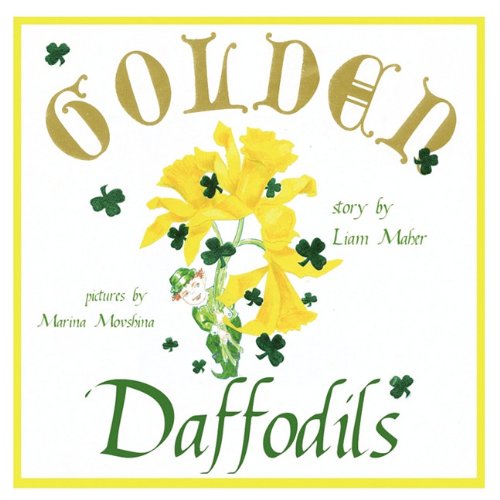
Daffodils are one of the earliest flowers to bloom in the spring and are often associated with springtime and rebirth. These trumpet-shaped flowers come in a variety of sizes and colors. Traditional daffodils are sunny yellow, but some varieties are white or pastel yellow and some are even pink or green. This is a great flower that people love to get because it is such a pretty flower.
The daffodil’s primary symbolism is that of new beginnings, rebirth and the coming of spring,
Though their botanic name is narcissus, daffodils are sometimes called jonquils, and in England, because of their long association with Lent, they’re known as the “Lent Lily.”
In Wales, it’s said if you spot the first daffodil of the season, your next 12 months will be filled with wealth, and Chinese legend has it that if a daffodil bulb is forced to bloom during the New Year, it will bring good luck to your home.
The daffodil symbolizes good fortune in the Chinese culture. In fact, it is so esteemed for its ability to bring forth positive things that it is the official symbol of the Chinese New year.
To the Japanese people, the daffodil means mirth and joyousness. In France, the daffodil is a sign of hope.
The Arabians believe the daffodil flower was an aphrodisiac and cure for baldness.
In the United States, the daffodil is the official symbol for the American Cancer Association, symbolizing hope for a cure. It is also the flower for the month of March and the symbol of the 10th wedding anniversary.
Daffodils were brought to Britain by the Romans who thought that the sap from Daffodils had healing powers. Actually the sap contains crystals that can irritate the skin.
The daffodil is native to the Mediterranean regions. Both the Greeks and Romans grew daffodils, but unexplainably abandoned them. They grew wild until 1629 when the English decided to cultivate them again.
Daffodils still grow wild in many European countries. In fact, in some areas of Switzerland and Austria the blooming of the narcissi is celebrated with festivals.
There is a tale from Ancient Greece that talks about a man name Narcissus who loved to look at himself, one day when he was looking at himself in a pool of water, he fell in and drown.
From his grave, a flower grew and it was the Narcissus, which is the more uncommon name for the Daffodil.
This is a flower that represents beauty and you would give this to someone to show that you admire them.

I Wandered Lonely As a Cloud – Poems by William Wordsworth
The daffodil is the National Flower of Wales. It’s bloom coincides with St. David’s Day, a celebration for the patron saint of Wales. Some associate the daffodil’s faithful rebloom with the David’s faithfulness to his people.
William Wordsworth, an English romantic poet, also references daffodils in his poem “I Wandered Lonely as a Cloud”, painting a picture of a hill full of bright, dancing blooms.
I wandered lonely as a cloud
That floats on high o’er vales and hills,
When all at once I saw a crowd,
A host of golden daffodils;
Beside the lake, beneath the trees,
Fluttering and dancing in the breeze.
He was known for walking the Lake District at great length, across those vales and hills, and must have seen a great many breathtaking sights along his journeys.
But something made him choose the daffodil. Something about its colour, its form, the appearance of a cluster of daffodils made him choose the daffodil for his poem, which would become not only his best-known work, but among the best-loved pieces of literature in the romantic tradition.
Types Of Daffodils
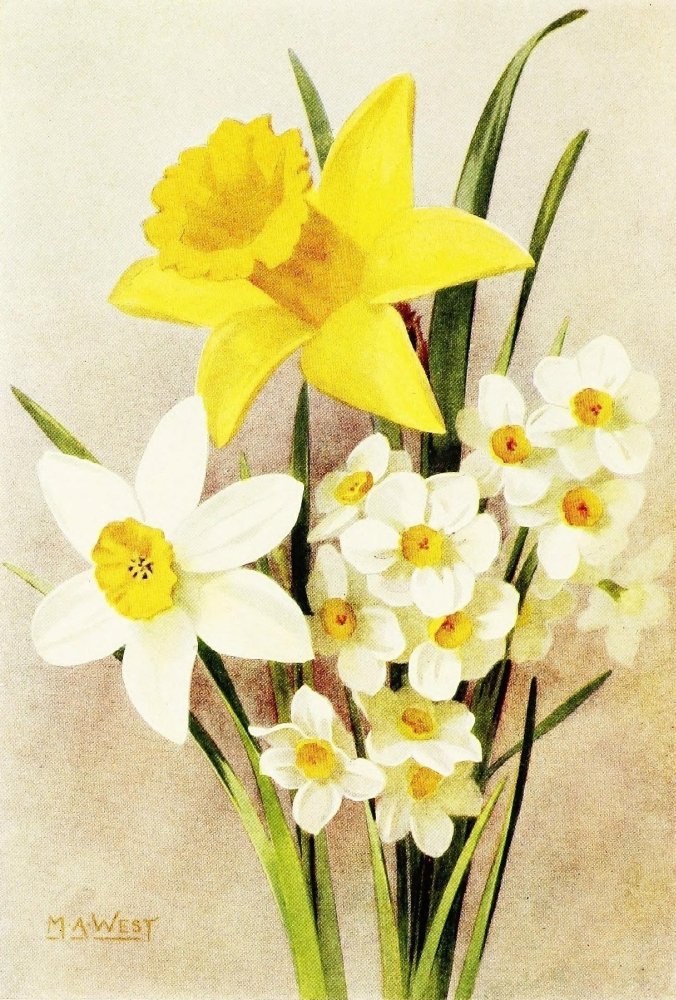
Maud Astley West – Bulb Gardening 1922 Daffodils Fine Art Print (45.72 x 60.96 cm)
There are at least 25 different species of daffodils, though not all are cultivated to the same extent. Currently there are over 13,000 different hybrid varieties available.
Daffodils are some of the most popular spring-blooming flowers being cultivated.They are extremely easy to grow: the bulbs require very little care after planting.Most types of daffodil are extremely winter hardy, and will grow in a wide range of climates.Unlike some other types of bulbs, deer and rodents don’t eat daffodil bulbs.Colours range from white to yellow, pink, salmon, orange, and red-orange.Several species of daffodils are very sweetly scented.
Some daffodils flower months ahead of others so, by combining early and late varieties, you can have daffodils in bloom from January to May.
1.Trumpet Daffodils
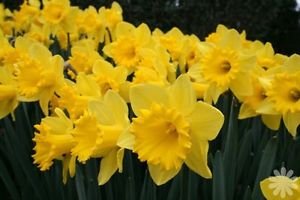
Trumpet Daffodils have the “traditional” daffodil form: there is one large blossom per stem and the trumpet is exceptionally long. Specifically: the length of the trumpet is equal to the length of the petals, or longer.
2.Large-Cupped Daffodils
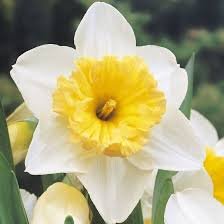
This is by far the most popular of all the daffodil varieties. Over 40% of all daffodil varieties cultivated are Long Cup Daffodils. Their popularity is well deserved.
3.Double Daffodils
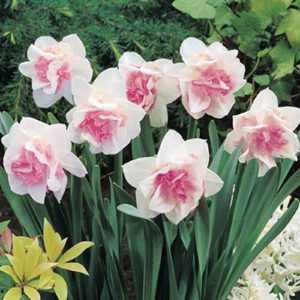
The term double means that extra petals are present. Sometimes a daffodil will have a doubled trumpet; sometimes it will have doubled petals (i.e. perianth segments), and sometimes doubles of both. As a result, Double Daffodils may resemble carnations or even gardenias rather than daffodils. Needless to say, this can look impressive.
4.Jonquilla Daffodils
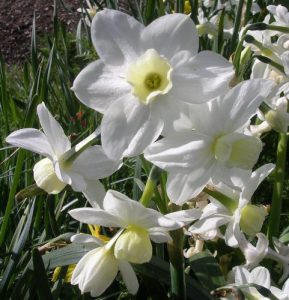
Plants4Less Daffodil ‘Silver Chimes’ narcissus jonquilla 12 bulbs
The daffodils of this group are noted primarily for their scent: the most fragrant daffodils of the Narcissus genus are found in this division.
These daffodils are also floriferous; in other words, they normally produce more than one flower per stem. On average, a Jonquilla Daffodil will have two to six blossoms per stalk.
5.Miniature Daffodils
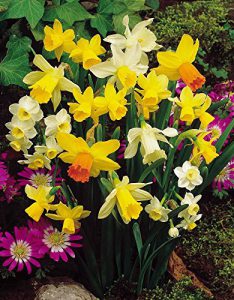
50 Mixed Miniature Daffodil/Narcissus Bulbs Dwarf Special Mixture Perennial
Miniature Daffodils are diminutive versions of standard daffodils. They have been selected or cultivated from existing species or varieties, and retain the basic form, blooming habits, colours, and the hardiness of these standard varieties.
6.Poeticus Daffodils
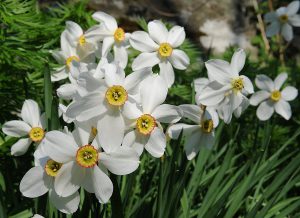
All of the daffodils in this division have large white petals with small, dainty cups in contrasting colours (such as golden yellow or lime green).
They all naturalize beautifully (naturalize = come back year after year and slowly multiply). Some Poeticus Daffodils are known to have been growing in the same garden, with very little care, for generations!
7.Small-Cupped Daffodils
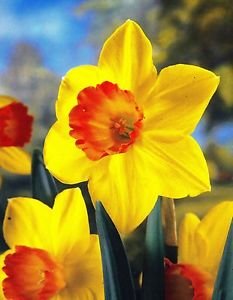
As the name implies, these daffodils have cups (i.e. trumpets) that are relatively small and shallow. Specifically, Short Cup Daffodils are defined as having a cup whose length is equal to or less than one third the height of the surrounding petals.
This group of daffodils is noted for their brilliant colours: the cups can be snow white, golden yellow, lime green, salmon, coral, orange, or vermillion red. They are a wonderful addition to any cut flower arrangement.
8.Split-Corona Daffodils

The blossoms in this division have a very unusual form. The term corona in the title refers to the cup (or trumpet) of the daffodil.
The cup is split for at least one-half its length, creating an open, up-facing blossom, instead of the typical trumpet. As a result, many of the flowers look more like a Hibiscus than they do a daffodil.
9.Tazetta Daffodils
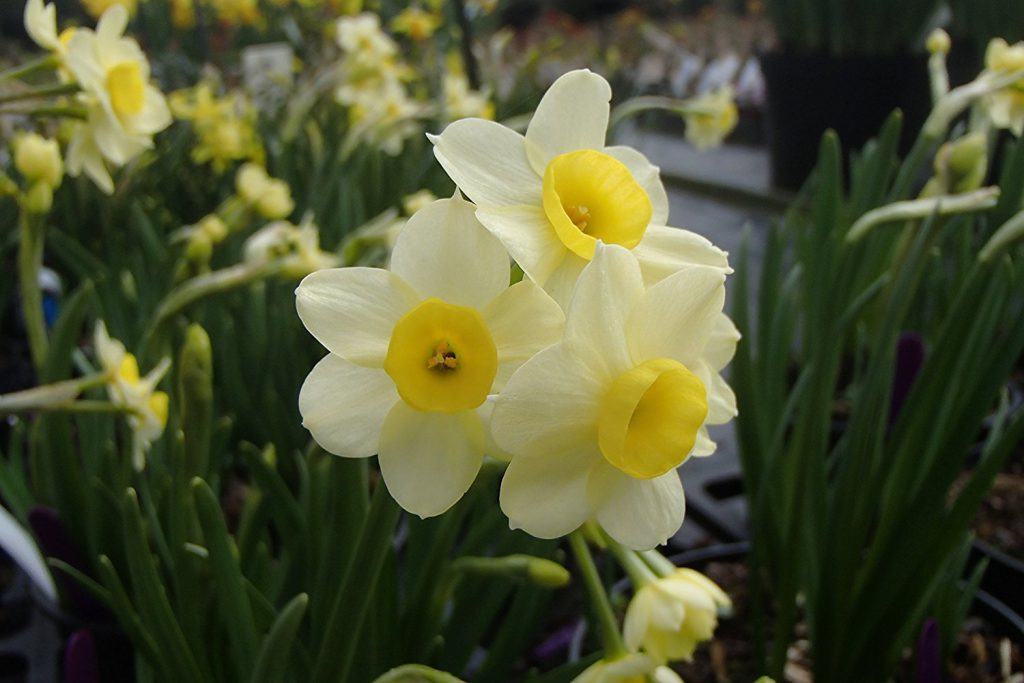
Narcissus tazetta ‘Minnow’ (Scented Minature Daffodil) – Pack of 20 Bulbs
Tazettas are floriferous or bunch flowering daffodils: they produce several blossoms per stem, at a minimum three or four. However, clusters of eighteen or even twenty are not rare.
They are particularly good for planting in the warmer zones.
10.Triandrus Daffodils
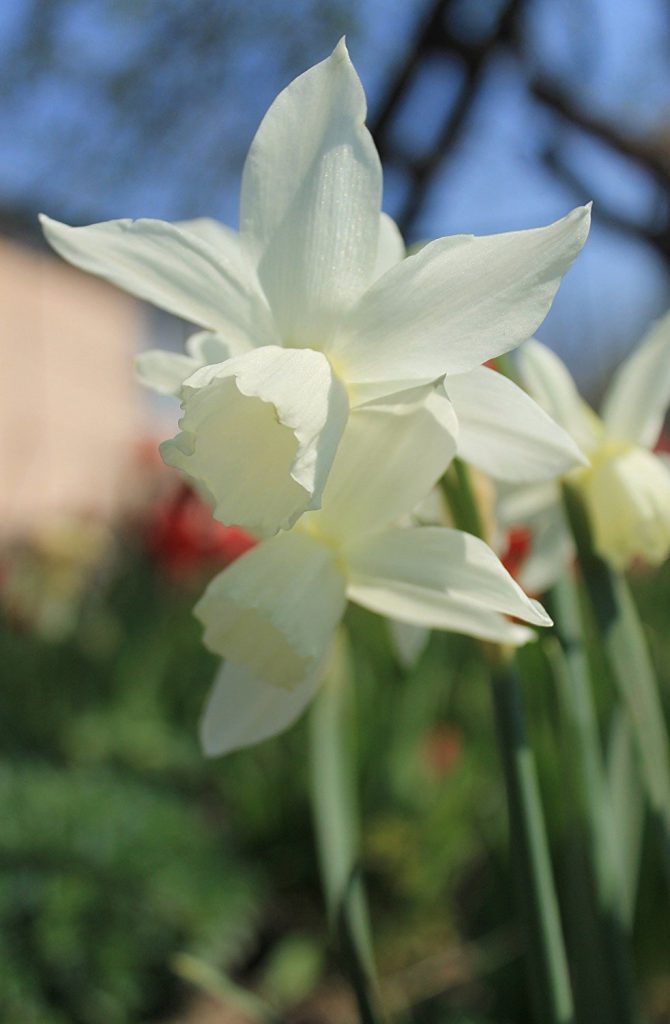
Narcissus triandrus ‘Thalia’ (Scented Daffodil) – Pack of 20 Bulbs
Triandrus Daffodils are normally floriferous; that is, they have more than one blossom per stem. The blossoms are somewhat pendant; i.e. the heads nod or droop slightly. As well, the petals are slightly reflexed (swept-back). With all of these features, Triandrus Daffodils are often said to resemble fuschias.
Growing Daffodils
Daffodils grow perennially from bulbs. In temperate climates they flower among the earliest blooms in spring. Daffodils often grow in large clusters, covering lawns and even entire hillsides with yellow.
Depth, as a general rule, needs to be thrice the height. This means large bulbs should have a depth of 6 to 8 inches, a medium size 3-6 inches and a smaller size 2-3 inches. Always remember that the load of soil proves helpful in protecting the bulbs from breaking too easily and in keeping them upright for a longer duration.
Interesting Daffodil Facts
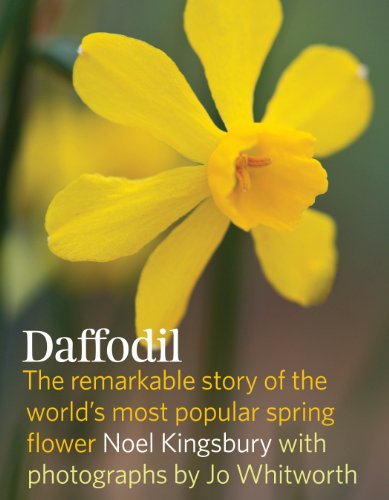
Daffodil: The remarkable story of the world’s most popular spring flower
1.Daffodil has leafless stem with one to 20 blooms on the top. It can reach 6 to 20 inches in height, depending on the variety.
2.Daffodils develop from the bulb which stores all nutrients required for successful development of the stem and flowers. Spring flowering bulbs are planted in the autumn. Cold period during the winter ensures proper development of root.
3.Besides from bulbs, daffodils can be propagated via seeds. Seeds are black, rounded and covered with protective hard coat.
4.They are one of the rare species of plants that are able to successfully grow through the snow.
5.Leaves and bulb contain toxic alkaloid called lycorine. This substance keeps predators (except certain types of insects) on a safe distance.
6.Due to toxic sap in the stem, daffodil should not be kept in the vase with other plants (it is harmful for them).
7.Florists can develop allergic reaction on the skin called “daffodil itch” after preparing floral arrangements made of daffodils.
8.Narciclasine is a substance isolated from bulb, which (according to some medical studies) has potential to treat breast cancer.
9.Keepers of poultry believe that daffodils prevent hens from laying eggs, and they avoid planting of daffodils on their farms.
10.Bunch of daffodils offered as a gift ensures happiness and represents good fortune, while single daffodil predicts misfortune.
11.More daffodils are planted than any other perennial ornamental plant. Britain is the major grower of daffodils for both flowers and bulbs, which are also grown commercially in the Netherlands, United States, Canada, New Zealand and Australia.
12.Wild daffodils were picked in great numbers in Britain in the past, and in the 1930s there was even a ‘Daffodil Special’ train service run by the Great Western Railway to take Londoners to the Gloucestershire-Herefordshire border to admire and buy the flowers.
13.Traditionally daffodils have been used to induce vomiting and as a poultice for burns and wounds. Unsupervised ingestion has proved fatal.
14.Modern uses include extracting galantamine from the bulbs to treat Alzheimer’s disease, research at the University of Copenhagen to use daffodil compounds as a treatment for depression and a Chinese study suggests daffodil compounds can kill off certain cancer cells (such as leukaemia)
15.The daffodil today is synonymous with the battle against cancer but 100 years ago Irishwomen used it as a symbol in their battle for votes while a militant fringe of Irish feminists fund-raised for rifles for their male counterparts in the Irish Volunteers.
Every year, colourful lapels all around Ireland raise important awareness and funds for the Irish Cancer Society. The first Daffodil Day for cancer awareness was held in Canada in 1957 and the event has run annually in Ireland since 1988.
If you have any information,questions, or feedback you would like to include in this post.
Please email momo19@naturekingdoms.com or leave your comments below.